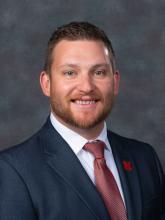
| Event Details |
|---|
|
Thursday, January 26, 2023 Talk:
3:30 p.m., Avery 115
Reception:
4:30 p.m., Avery 115
|
Eric Markvicka, Ph.D.
Assistant Professor, University of Nebraska–LincolnAbstract
Emerging applications in wearable computing, human-machine interaction, and robotics will increasingly rely on new soft-matter technologies (e.g. rubbers, gels, fluids) to provide a conformal, unobtrusive, and compliant means of interfacing with the human body and surrounding environment. These soft-matter technologies have the potential to unlock a wide range of new applications, including health monitoring, human performance augmentation, and adaptation to changing enviroments. However, unlike previous platforms, these wearable platforms require structural conformity, must be comfortable for the wearer, and should be soft, elastic, and aesthetically appealing. In this talk, I will present recent progress on our efforts to create wearable electronic skins for existing robotic platforms and for long-term human health and activity monitoring. Work in this area focuses on the development of new soft-matter sensors, stretchable electrical wiring, and holistic fabrication approaches to create fully untethered, stretchable electronic skins that are not only highly-functional but aesthetically pleasing.
Speaker Bio
Dr. Eric Markvicka is an Assistant Professor in the Department of Mechanical and Materials Engineering at the University of Nebraska-Lincoln (UNL). There, he also holds a courtesy appointment in the School of Computing and Department of Electrical and Computer Engineering. At UNL Eric directs the Smart Materials and Robotics Laboratory, an interdisciplinary research lab that is creating soft multifunctional materials that exhibit a unique combination of mechanical, electrical, and thermal properties. These materials are critical components for the emerging fields of wearable computing, soft robotics, and robotic materials. Before joining the faculty at UNL, Eric received his B.S. and M.S. in Mechanical and Materials Engineering from UNL and his M.S. and Ph.D. in Robotics from Carnegie Mellon University.